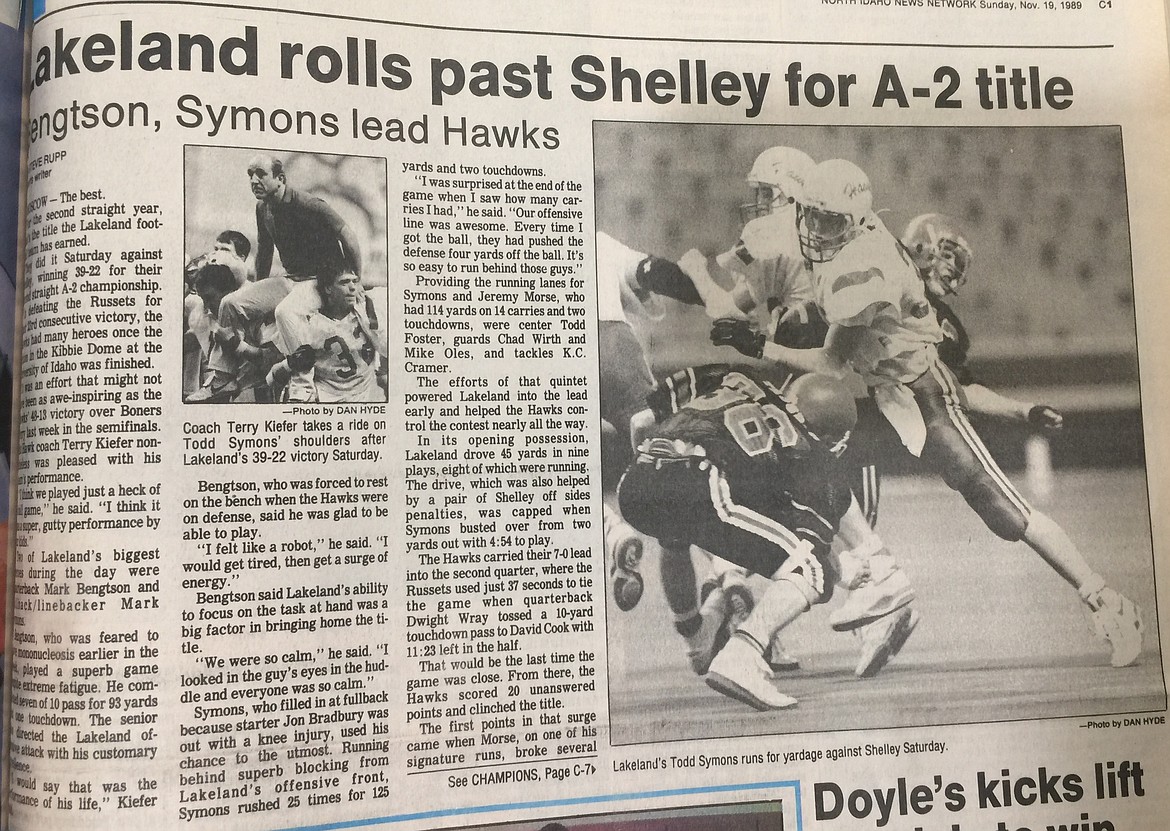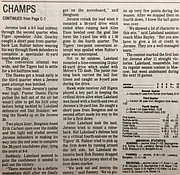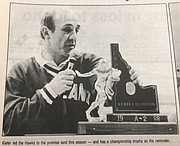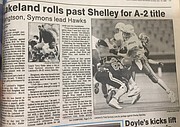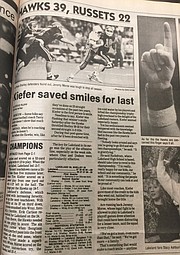HOW THEY WERE BUILT: Lakeland High football — Kiefer: One year led to another, and a powerhouse followed
It was only supposed to be a one-year gig.
It was 1980, just prior to the start of the football season, and the Lakeland High head football coach decided to quit.
The Hawks needed somebody to take over the program, quick.
Terry Kiefer had been an assistant coach the past three seasons at Lakeland, his alma mater.
“So they said, ‘Terry, you just take it for one year, do it for one year, then we’ll get somebody else,’” Kiefer recalled.
Well, Lakeland never had to get somebody else.
Kiefer coached that season ... and the next ... and the next ...
“Well, 20 some years later,” he said with a laugh, “I quit.”
But not before Kiefer turned Lakeland into a powerhouse in the A-2, and then 3A, divisions. He guided the Hawks to 11 Intermountain League titles, a pair of state championships in 1988 and ’89, and two other state title game appearances in 2000 and ’01. He called it quits as a head coach following the 2002 season, but not before compiling an overall record of 173-71-2 in 25 seasons over two stints as head coach.
Kiefer, of course, was happy to pass the credit for his success on to others.
“It was a combination of a lot of things — great kids, great coaches, great parents, administration,” said Kiefer, now 75.
HAD TERRY Kiefer and his wife made a different decision back in 1973, instead of being known as the longtime football coach at Lakeland High, Kiefer could have been known as ... the longtime boys basketball coach at Kootenai High.
But, first things first.
A lifetime resident of Rathdrum, Kiefer attended what was then called Rathdrum High his first two years of high school. In 1961, the kids from Spirit Lake High came down to Rathdrum, and the school’s name was changed to Lakeland High.
Kiefer’s first 3 1/2 years of high school were spent in what is now the alternative school building on Main Street. The last half of his senior year, he went to the new Lakeland High, in the building which is now Lakeland Middle School.
His senior year, he played on an undefeated football team coached by Tom Kane, in his first season of an 11-year stint with the Hawks.
Kiefer played two years at halfback and one year at quarterback at Lakeland, before playing wingback his senior year — despite a broken left hand, suffered in the preseason.
“That was the first year they had a rule if you had a cast, you can’t play,” Kiefer said.
However, that was also Cotton Barlow’s first year as Coeur d’Alene High football coach. One of his sons had suffered a broken arm or hand the previous spring, and it had a hard time healing, and was still in a cast when football started. Barlow successfully appealed to the Idaho High School Activities Association to allow his son to play, and because of that, Kiefer was allowed to play as well.
“We had to wrap up the cast up with foam, so it was basically a big club,” Kiefer said.
“Kellogg was a league ahead of us. I’m pretty sure Kellogg went undefeated and we went undefeated, and there was talk of us having a game,” Kiefer recalled. “I got to know some of the Kellogg guys in college, and I think we were kind of thankful that we didn’t play them.”
KIEFER WENT to North Idaho College, where he played two years of baseball, then to the University of Idaho. In Moscow, Kiefer told the Vandal football coaches he wanted to learn more about football, as he was thinking about becoming a coach at the time.
So they let him turn out for spring football, and he went through all the drills with the other players, soaking up what he could.
“Really, back then, my main interest was in basketball,” Kiefer said.
After graduating from Idaho in 1968, Kiefer taught and coached at Kootenai High for five years.
The first year, he was assistant football coach and head track and field coach.
“Then our principal left, he left in the middle of the year, and the superintendent called me in and said he wanted me to be the principal,” Kiefer recalled.
Fresh out of college, he was principal at Kootenai for some three years.
“You talk about a great community. People up there, they were the greatest group of people, and kids.”
He was basketball coach his last two or three years at Kootenai, and remembers playing Lakeland back then. Basketball coach and principal.
At that point, Kiefer and his wife had to make a decision — stay at Kootenai and make it a career, or head somewhere else.
His father passed away when he was 12, but his mom still lived in Rathdrum, and they would come up from Harrison for the occasional visit.
Kiefer knew the superintendent at Lakeland at the time — Dick Snook.
“One day I thought, ‘You know what, I’m just going to go up there and find out what would be the possibility of getting a job,’” Kiefer recalled.
“This was on a weekend, and I walked into his house, and I said, ‘Hey, what would be the possibility of getting a job?’
“He says, ‘You’re hired.’”
Dick Schultz, a high school teammate of Kiefer’s who was coaching at East Valley, was named Lakeland head football coach in 1973, and he also was boys basketball coach. Kiefer was an assistant football coach and JV basketball coach that year.
But after one season Schultz returned to East Valley, and Kiefer took over as head football coach in 1974.
He guided the Hawks for two seasons, then resigned.
“After those two years, to be a successful coach, I don’t know if I want to commit all that time and energy and everything it’s going to take to do this,” Kiefer thought at the time. “So I got out.”
For only a year, though.
Gary Garland was named Lakeland football coach in 1976, and he guided the Hawks for four seasons.
Kiefer returned to the coaching staff in 1977, and was an assistant under Garland for three years.
Then Garland left, Kiefer was named head coach in 1980 for what was supposed to be just the one season ...
And a Kiefer has been Lakeland’s head football coach ever since.
“My boy Tim was starting to get interested in football,” Kiefer said. “I thought, ‘Well, heck, I’ll keep going, a year at a time, and see how it goes.’ Anyway, one year led to another ... ”
When Terry resigned in 2002, Tim Kiefer took over for his father as head coach. This year will be Tim’s 18th season as Hawks head coach.
TERRY KIEFER said he doesn’t remember his Lakeland bosses officially asking him to come back after that 1980 season. He just kept coming back.
Lakeland went 1-7 his first season back as head coach.
“We scored first in every game we played, and we ended up losing,” Kiefer recalled of that ’80 season. “Basically it ticked us off so much that we wanted to make it better. And every year we just kept getting better and better and better and better.”
In 1981, Lakeland went 6-3 and advanced to the state playoffs, losing to Bishop Kelly in the first round.
Back-to-back 4-4 seasons followed, then the Hawks went 6-3 in 1984; 8-2 in ’85, losing to Vallivue in the state quarterfinals; 7-2 in 1986 and 9-2 in ’87, losing to Weiser in the state semifinals.
“Every year we kept getting better and better, so it was really encouraging, and the kids were enthusiastic,” Kiefer said. “You could just see it growing.”
Some assistant coaches who turned into longtime assistant coaches helped.
In Kiefer’s first year back as head coach, in 1980, Lee Libera joined the staff as offensive coordinator, where he stayed for many years before switching over to defensive coordinator.
Will Havercroft came on board the next year, Mike Bayley a few years later, along with Jules Edwards from Priest River.
“When you have guys that are really good coaches, and they’re good with the kids, and we were all good friends, it makes a big difference in staying there and continuing to coach,” Kiefer said.
Also in the early 1980s, Lakeland started a Junior Tackle program — and some of the first kids in that program eventually formed the nucleus of the Hawks’ back-to-back state title teams later in the decade.
In 1985, Lakeland hired a principal, and the man, who had been a head football coach back in Indiana, came out and helped out the Hawks as an assistant football coach.
Fellow by the name of Chuck Kinsey.
“Just little bit by little bit, everything was starting to fall into place,” Kiefer said.
LAKELAND BROKE through for its first state title in 1988, beating Jerome 13-12 in the A-2 title game at Holt Arena in Pocatello to finish 11-1. The game-winning PAT was booted late in the game by Jason Galbraith, a lineman with a square-toed kicking shoe. He was normally the Hawks’ kickoff guy, but was pressed into point-after duty when Jeremy Morse fell ill.
“Going down (to Pocatello), Jeremy Morse got some kind of a bug,” Kiefer recalled. “We stopped in Missoula to practice, and Jeremy went out, and he tried to practice, and it just wasn’t working out, so we sent him back into the locker room.
Morse still wasn’t feeling well for the game, and though he played some, he missed the PAT after Lakeland’s first touchdown.
So later in the game, Galbraith put on his kicking shoe and booted the game winner.
“He had nerves of steel, Jason did,” Kiefer said. “There wasn’t anything that bothered him.”
Another key play late in that title game was made by safety Rob Ranney, now a longtime assistant coach at Timberlake.
Lakeland was leading, but had just turned the ball over on downs. The Hawks needed a defensive stop. Problem was, Ranney had apparently broken his hand during the game.
“Will had a plan on how he was going to use Rob, and Rob went in and played with a broken hand,” Kiefer recalled.
Jerome had a fourth and short near the Lakeland 30, and Ranney came up to make the defensive stop.
Lakeland then marched the ball down the field, running the ball between the tackles, as was its M.O. at the time — 3, 4, 5, 6 yards at a time. The Hawks got down near the goal line with less than a minute left — and Lakeland told the QB to take a knee.
Time ran out, and the Hawks had their state title.
“Some of my high school classmates were at the game,” Kiefer said. “One of them had two kids on the team. Boy, after the game, here comes the dad, my old high school classmate ... ‘Terry, what the heck, we wanted you to punch that in. We wanted to beat ’em bad.’
“I had to tell him why we didn’t do it.”
Kiefer explained to his former classmate that had Lakeland scored and kicked off, that would have given Jerome a chance to score and tie the game.
“And we weren’t going to give them a chance to do that,” Kiefer said.
The next year, Lakeland capped a 12-0 season — Kiefer’s only perfect season — with a 39-22 win over Shelley in the title game at the Kibbie Dome in Pocatello.
“Well, it makes you feel good,” Kiefer said of the two titles. “You’re happy for the community, you’re happy for the school, and you’re especially happy for the kids, because they worked really hard. We just had some really, really good kids, and they were tough kids, but they were really nice kids. So it made it pretty easy.
“Along with winning a state championship were some of the teams we had that maybe we didn’t win a state championship, but they probably played to the best of their ability, and those are some of the teams you are really thankful that you got a chance to coach those kids.”
Tim Kiefer played on both of his dad’s state title teams, as a receiver and outside linebacker, graduating in 1990.
“Poor Tim,” Terry said of coaching his son. “I think he got the worst end of the deal, because you don’t want to play favorites, so you might say Tim got discriminated against a little bit, because I didn’t want show favoritism toward him. But he handled it pretty well.
“I remember when Tim was a senior, and we would go to the all-league meeting; that’s where you’d pick your all-league team. And Tim was far and away the best outside linebacker in the league — anywhere around, really. And so it came time to pick linebackers, and I wouldn’t nominate him.
“And I noticed ... nobody would say anything, and nobody would nominate anybody, because they kept waiting for me to nominate Tim. And I wasn’t going to nominate him. And I can still remember Will Havercroft saying, ‘Well, for God’s sakes, if you’re not going to say anything, I’m going to. I’m nominating Tim Kiefer.’ And all of the other coaches were like, ‘Well, we were waiting for you to do that.’”
Lakeland continued to be a state contender through the 1990s and early 2000s, winning eight IML titles and advancing to the state playoffs 11 times. The Hawks reached the title game in 2000 and ’01, both times falling to Snake River. Kiefer’s final game as head coach was a loss to Weiser in the state semifinals in 2002.
Tim took over in 2003, and Lakeland moved up to 4A in 2004.
“He knows so much more football than I ever did, it’s not even funny,” Terry said of Tim. “He’s plugging away, and doing a good job with the kids, and hopefully he’s going to get things rolling here.
“It’s tough being one of the smaller schools in the 4A, and not only that, they’re letting so many of the 5A schools, enrollment wise, down into the 4As. It makes a difference, especially in football, when you’re competing against schools who are half-again or twice as big as you, enrollment wise.”
In the 1990s, Lakeland was one of the bigger schools in what was then called A-2, but “we weren’t always that way,” Terry said. “I know there were some schools that talk about Lakeland being so big, and that’s why they’re so good. Well, the thing of it was, we weren’t always that way. A lot of those schools (in the 1970s and ’80s) ... Kellogg was a big school, Wallace was a big school, St. Maries was a big school, Bonners Ferry was a big school. When we all joined (the league) together, they were all bigger than us.
“But I tell you, back in the ’80s, and up through the mid- or most of the ’90s, our league was probably the toughest league in the state,” Terry said. “There was more than one year where the No. 1-rated and the No. 2 rated team in the state would be from our league.”
ANOTHER FACTOR in Lakeland’s success, Terry Kiefer said, was getting weightlifting started at the school in the early 1980s.
In those days, during a coach’s study hall or prep period, players would go lift.
“We didn’t have any money. We made our own weight bars,” Terry recalled. “I went into a steel place in Spokane, they cut the bars, we came back over here, we welded on collars in the metal shop. I went over to Hern Iron Works (in the industrial park, off Atlas), and they made weights for us.
“Those weights,” he said with a laugh. “You might have a 45-pound weight, but it might weigh 48 1/2 pounds. But that’s what we used for years and years and years. And we made our own weight benches, and our own squat racks, and that’s what we used, forever.”
They didn’t look like the rubber-coated weights used today — these were iron.
“It’s really funny ... none of the kids know this, to this day,” Kiefer said. “But when they would do, say for instance, a clean, the weights weren’t exactly round, so as soon as they would pick the bar up, the heaviest part of the weight would start rolling down toward the bottom. And the kids, they could never figure that out. But they never did know, basically, the hole wasn’t in the middle. It would be off a little bit. But that’s what we used. And I tell you what, we had some tough kids. We had some strong kids, some super strong kids.”
The Hawks moved into the modern era of weight room equipment years ago — but there may be some of those iron weights still lying around at Lakeland, as a conversation piece.
A FEW years ago, Terry Kiefer wandered over to Lakeland Junior High, where the Hawks played their home games for years before Corbit Field was built across the street at the high school, for a Junior Tackle game and saw his name on a sign by the field — Terry Kiefer Field.
They had named the field after him.
“I didn’t know anything about that,’ Terry said. “I looked up there and I thought, ‘My God.’ Nobody said anything to me about it. Nothing. I didn’t have a clue. Walked in there and there it was.”
Kiefer graduated from Idaho with a double major — business education, and P.E.
The Kiefer name is well-known in these parts. Betty Kiefer Elementary in Rathdrum is named after his sister-in-law, a longtime teacher.
After Terry resigned as head coach at Lakeland, he stayed on the coaching staff as an assistant.
He’s still on the coaching staff, most recently helping out with the junior varsity team.
He looked back on how far the Lakeland football program has come over the years — decades, really. He remember his second year as head coach, when there were 26 players in the program who had never played football before.
“I hope first of all, we left the program a little better than when I took over. And I think of me taking over as being in 1980,” Kiefer said. “All the assistant coaches, and the kids, we had such a great time coaching those kids. You think back on all the fun times that you have.”
These days, Terry Kiefer keeps busy tending to the 14 acres where he lives on the base of Rathdrum Mountain.
He said he wonders if last year might have been his last year as a coach.
Of course, Terry Kiefer also wondered that some 40 years ago.




